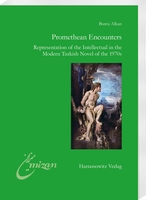|
weitere Titel zum Thema:
Download:
Bitte beachten Sie: Mit digitalen Produkten in Ihrem Warenkorb
wird die Bezahlung nur per PayPal möglich. Der Download dieser Produkte wird bereitgestellt, wenn die Bezahlung bestätigt ist. The Turkish novel of the 1970s was significantly shaped by the leftist activism of the 1960s and the prosecutions following the military intervention on 12 March 1971. While the repercussions of these two decades determine the politics of the majority of novels published in this period, the worlds they depict extend far beyond. In such a definitively political and historical turn in the Turkish literary sphere, the position of the intellectual emerges as a key theme in many works, along with the legacy of the transition from the Ottoman Empire to the Turkish Republic and the modernization project that followed.
Promethean Encounters primarily examines Adalet Ağaoğlu’s Ölmeye Yatmak (1973), Attilâ İlhan’s Bıçağın Ucu (1973) and Yaraya Tuz Basmak (1978) as well as Füruzan’s Kırk Yedi’liler (1974) along the lines of the interrelations among intelligentsia, state, and public. It focuses on the intellectuals’ disengagement from the state, their failure to relate with the people, and the consequences of such disconnections. As it contextualizes the concept of the intellectual within an international theoretical framework, its analyses both provide an in-depth view of the literature of the period and address the enduring contemporary conflicts. |
|||||||||||||||||||||||||||||||||||||||






